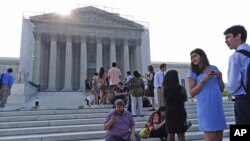WASHINGTON —
The U.S. Supreme Court wraps up its term this week with rulings in a number of high-profile cases including voting rights and gay marriage.
On Monday, the high court avoided a sweeping ruling in a case involving affirmative action and the University of Texas. The court decided by a vote of 7-1 to send the case back to a lower federal court for review.
The case involves a white student applicant to the University of Texas, Abigail Fisher, who says she was denied admission because of school requirements aimed at ensuring diversity and the admission of minority students.
Civil-rights activists welcomed the decision because the high court declined to strike down the affirmative-action policy outright. Wade Henderson is president of the Leadership Conference on Civil and Human Rights.
“The educational benefits of diversity are clear and the court’s decision reaffirms that it is in our national interest to expand opportunities for everyone,” Henderson said.
But some conservative groups critical of government mandated affirmative action programs also reacted favorably to the decision.
National Center for Public Policy Research Executive Director David Almasi says the Supreme Court’s ruling ordering a lower court to ensure the university’s affirmative-action plan is “narrowly tailored” is encouraging.
“We should not have a large blanket that we throw across our school systems saying that you are guilty until you get a certain amount of students within your student body that meet the bean counting that is set up by a bureaucrat in the state capital or Washington, D.C.,” Almasi said.
Affirmative action programs came into vogue in the 1960’s as one way to redress decades of racial discrimination in the United States. In 2003, the Supreme Court affirmed that race can be one of many factors considered in student admissions because a majority of the court ruled that there is a compelling interest in having a diverse student body.
The high court is scheduled to wrap up its term this week with potentially far-reaching decisions that involve voting rights and gay marriage.
The court is considering whether to strike down a key section of the Voting Rights Act of 1965, one of the most significant civil-rights laws in U.S. history. The law requires states with a history of racial discrimination to clear any changes in voting procedures with the federal government.
The high court is also slated to announce two rulings on gay marriage that could have significant legal and political implications on that issue. The first is a challenge to California’s Proposition 8, a voter-approved ban on same sex marriages in that state.
The second case involves the constitutionality of a federal law known as the Defense of Marriage Act that defines marriage as solely between a man and a woman.
On Monday, the high court avoided a sweeping ruling in a case involving affirmative action and the University of Texas. The court decided by a vote of 7-1 to send the case back to a lower federal court for review.
The case involves a white student applicant to the University of Texas, Abigail Fisher, who says she was denied admission because of school requirements aimed at ensuring diversity and the admission of minority students.
Civil-rights activists welcomed the decision because the high court declined to strike down the affirmative-action policy outright. Wade Henderson is president of the Leadership Conference on Civil and Human Rights.
“The educational benefits of diversity are clear and the court’s decision reaffirms that it is in our national interest to expand opportunities for everyone,” Henderson said.
But some conservative groups critical of government mandated affirmative action programs also reacted favorably to the decision.
National Center for Public Policy Research Executive Director David Almasi says the Supreme Court’s ruling ordering a lower court to ensure the university’s affirmative-action plan is “narrowly tailored” is encouraging.
“We should not have a large blanket that we throw across our school systems saying that you are guilty until you get a certain amount of students within your student body that meet the bean counting that is set up by a bureaucrat in the state capital or Washington, D.C.,” Almasi said.
Affirmative action programs came into vogue in the 1960’s as one way to redress decades of racial discrimination in the United States. In 2003, the Supreme Court affirmed that race can be one of many factors considered in student admissions because a majority of the court ruled that there is a compelling interest in having a diverse student body.
The high court is scheduled to wrap up its term this week with potentially far-reaching decisions that involve voting rights and gay marriage.
The court is considering whether to strike down a key section of the Voting Rights Act of 1965, one of the most significant civil-rights laws in U.S. history. The law requires states with a history of racial discrimination to clear any changes in voting procedures with the federal government.
The high court is also slated to announce two rulings on gay marriage that could have significant legal and political implications on that issue. The first is a challenge to California’s Proposition 8, a voter-approved ban on same sex marriages in that state.
The second case involves the constitutionality of a federal law known as the Defense of Marriage Act that defines marriage as solely between a man and a woman.





